[ad_1]
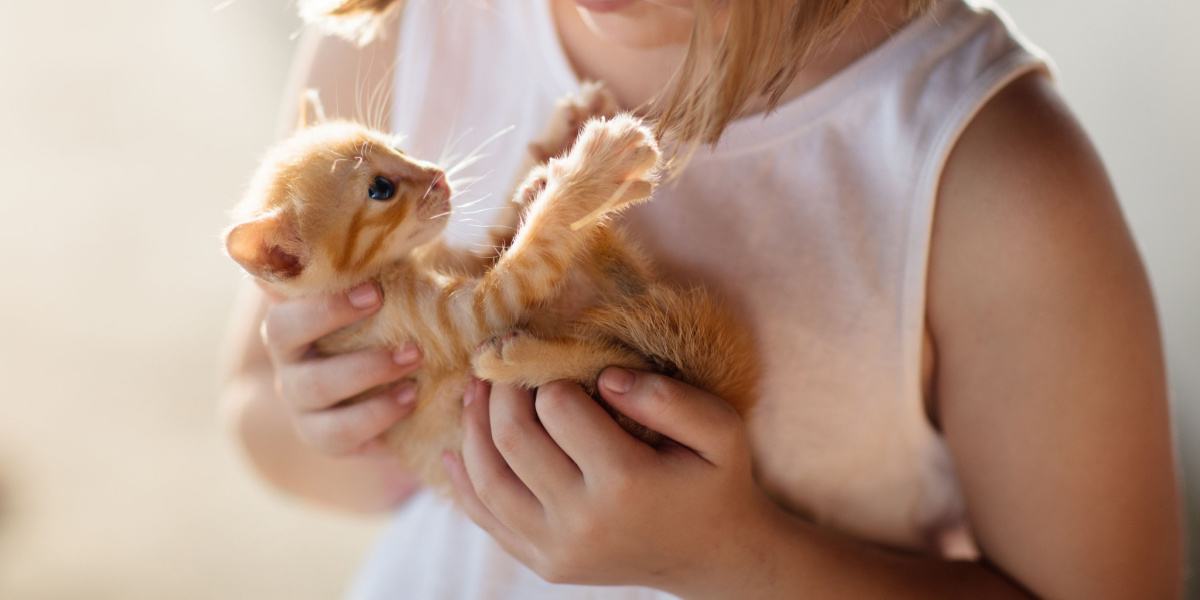
The best time to socialize a kitten is from birth, with their mother. So if you have a cat that has had a litter of kittens, well done for thinking about getting them socialized nice and early.
In most cases though, by the time you get your new kitten, they might have been separated from their mom for some time, whether they’re a hand-reared orphan kitten or left mom before ending up in an animal shelter or with a rescue group. Even so, kittens can still be socialized in some cases, so the sooner you start the better.
Quick Overview
01
Kittens that have been socialized to handling and habituated to the noises of a household will be less stressed adult cats and more likely to enjoy the company of humans.
02
The critical socialization period for kittens is 2 to 7 weeks. After 7 weeks of age, it’s technically not possible to socialize kittens, but it’s possible to help them settle around humans with lots of positive reinforcement.
03
It’s essential to keep socialization experiences positive so you don’t frighten the kitten and create a negative association.
Whatever their circumstances, socializing kittens is important—it helps them to adapt to living in human homes and enables them to be confident and friendly members of the family.
What Does It Mean To Socialize A Kitten?
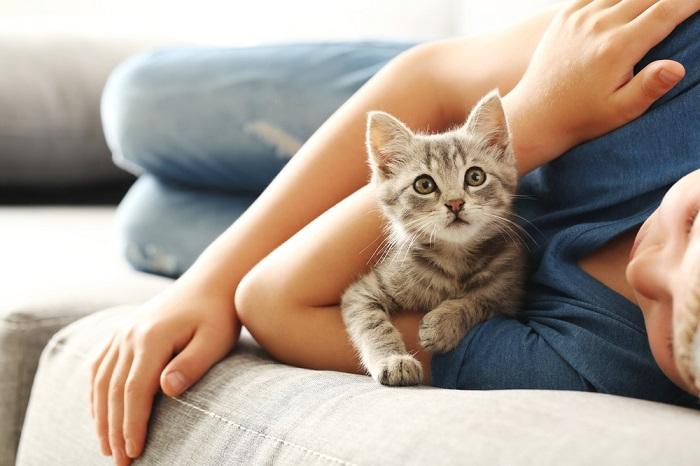
From about 2 to 7 weeks of age, a kitten’s curiosity outweighs their fear.
When we talk about “socializing” kittens, we are discussing using a critical period of development to help our kittens grow up strong and sociable. From the age of 2 to 7 weeks, kittens’ brains are open to new experiences.
During this time, they tend to view new experiences as interesting, rather than frightening, and they’ll file away experiences as “normal.” In other words, during this socialization period your kitten is learning what it means to be a modern cat and working out the skills they need to navigate the world.
With no positive experiences with humans, such as what happens with feral kittens, cats at this age will learn to be scared of humans, cars, houses, and other aspects of modern living. This makes them very difficult to later tame.
If we want our cats to be happy, we need them to enjoy human company and feel calm and confident living in our homes. This means lots of positive exposure to everyday stimuli in order to build confidence.
Also Read: Do Mother Cats Discipline Their Kittens? A Veterinarian Explains
The types of things you might want to expose your kitten to include:
- Handling (including a vet exam)
- The cat carrier and car journeys
- Grooming and toothbrushing
- Sounds (including fireworks and thunderstorms)
- Different types of litter and litter boxes
- Different textures of cat food (wet food and dry food)
- Different people (ideally including a mix of ages and ethnicities)
- Different toys
- Other pets
Also Read: Single Kitten Syndrome: What Is It?
Is It Good To Socialize A Kitten?
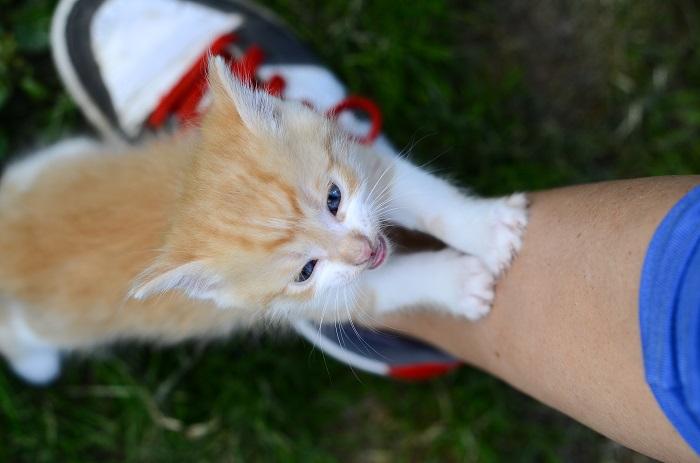
Socializing a kitten helps them grow up to be accepting of human interactions—on their own terms of course.
Kitten socialization is extremely important. It is these early, positive experiences that makes the difference between a feral cat and a family member. Kittens that have been socialized to handling and habituated to the noises of the household will be less stressed adult cats.
They’ll be less prone to diseases associated with stress, they’ll be easier to look after and get to the vet when needed, and they’ll be more likely to enjoy your company.
Also Read: How To Take Care Of A Kitten: The Complete Guide
What Happens If You Don’t Socialize A Kitten?
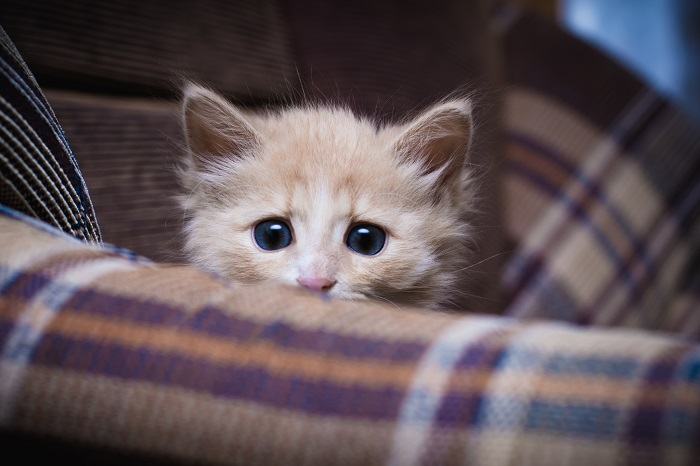
Kittens that aren’t socialized and handled while young might fear human contact and hide a lot.
Even if you don’t actively socialize a kitten, they might pick up some positive experiences if they’re brought up in a family home. For instance, a kitten living in a house that has been fed every day by a human and has been exposed to everyday household noises will have some positive experiences of humans.
Compare this to a feral cat that has never been exposed to these things as a kitten, and you can see that there is a spectrum of socialization with a wide variety of possible outcomes.
If you don’t socialize a kitten at all, and they don’t have any exposure to positive experiences, it’s possible they will behave like a feral kitten—they will fear human contact, hide a lot, and even become aggressive when handled. Unfortunately, these cats can be extremely stressed by being kept indoors and sometimes it is kinder to find them a home as a barn cat so they can live with little human interaction.
Most kittens reared in a family home will naturally pick up small amounts of socialization. For instance, they might come to know the sound of the vacuum, have positive interactions with humans when fed, and even get to meet other animals like dogs. These partially socialized cats are often fine to live in a house.
However, negative experiences at this age (such as being scared by a dog or hurt by an over-excited child) can be extremely damaging—unless socialization is carefully managed it can do more harm than good.
Also Read: Sexing Kittens: How To Determine The Sex Of Your Kitten?
How To Socialize A Kitten
Socialization should ideally happen before the age of 7 weeks old, so it’s not always something you have a lot of control over if you’re adopting a kitten.
Try to find a breeder or rescue volunteer who has properly socialized the kittens before you take them home. If your cat has had a litter of kittens or if you hand-reared an orphaned kitten, it’s your job to do the socializing before they go to their new home. Here are some tips:
1. Start Small

Expose your kitten to potentially scary things in small doses so as not to overwhelm them.
You want to avoid overwhelming your kitten, so don’t rush straight into a scary situation. Start small instead. For sounds, start them quietly or in a different room. For handling, don’t rush to pick them up for long periods of time. When your kittens meet new people, make sure it’s for a brief visits.
For meeting other animals, let your kitten see them through a barrier several times before allowing them to meet. Once your kitten is confident with these things in their smaller/shorter/quieter form, you can build up to longer handling, louder noises.
Also Read: The Complete Guide to Bottle Feeding Kittens
2. Make It Positive
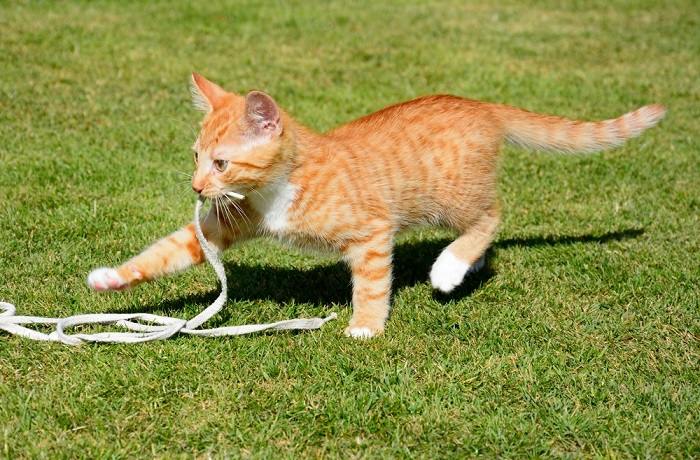
Playing with kittens using toys is a great way to form positive associations.
It’s essential that these experiences are kept positive—the last thing you want is to frighten your kitten and create a negative association. This means using positive modifiers such as food and treats for weaned cats, and proximity to mom for unweaned cats, to help make the experience positive.
Toys are also a great way to build positive associations. Try playing with a wand toy to keep your kitten’s attention off the scary stimuli.
3. Respond To Your Kitten’s Mood

If a kitten is becoming overwhelmed by a new stimulus or interaction, dial things back and try again later.
If your kitten is showing signs of fear it’s very important that you respond by making the situation less scary. Make the noise quieter, put them down, or get some distance from the scary object.
Some people advocate that you try to “flood” them—in other words, keep exposing them to the scary thing regardless of their fear in the hope they decide it’s not scary after all. However, this strategy is not recommended and has a high chance of causing long-term fear and phobias.
Also Read: The 7 Best Cat Treats For Kittens
4. Repeat, Repeat, Repeat
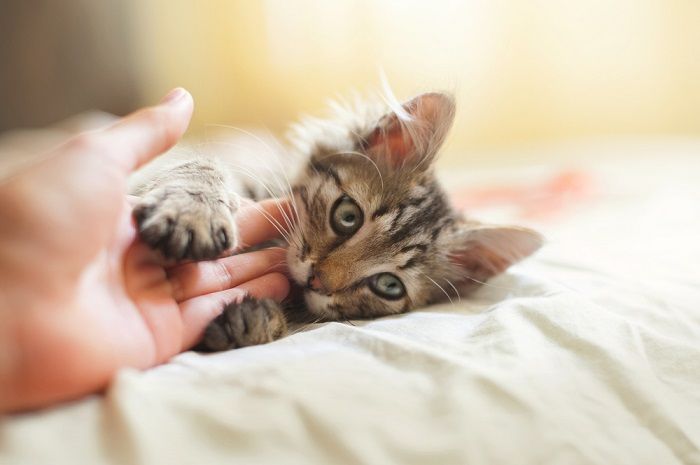
Provide your kitten with repeated, positive exposures so they become accustomed.
It’s no good just to expose a kitten once and call it done. Regular exposure is much more effective. That means you need to repeat each socialization topic several times between the ages of 2 and 7 weeks to make sure it works.
5. Include Mom
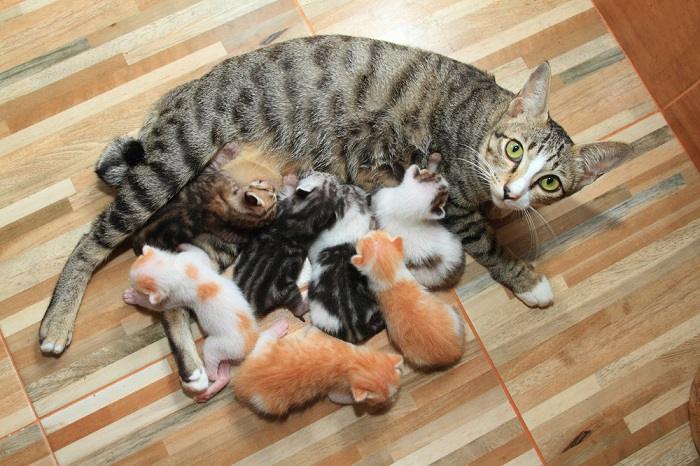
If you have a good bond and relationship with the mother cat, she will relay those positive vibes to the kittens.
If your kitten’s mom is around, it’s important to earn her trust. She will be passing messages to her kittens about what’s safe and good and what’s scary and new, so having a good relationship with her is key. If you adopt a pregnant mother cat, try to work with the mom to form a bond before the kittens come along.
6. Follow A Chart
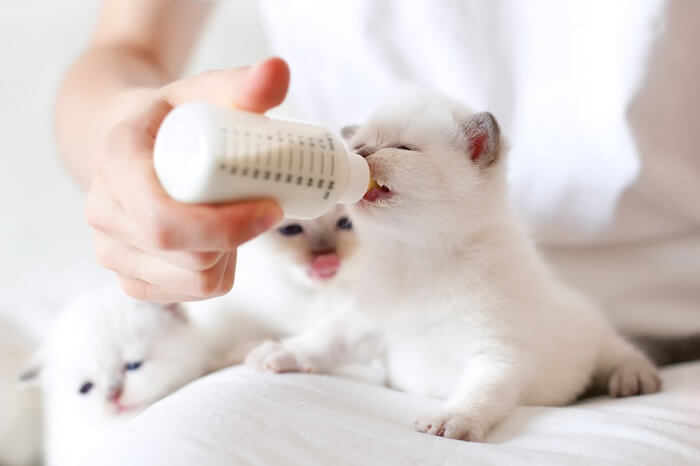
It can help to keep a written record of the things you have exposed the kittens to, as well as how many times.
It’s a good idea to follow a socialization chart to ensure you’re including all the right things. These charts list the things you should expose your kitten to, as well as remind you to repeat them regularly. You can also use a socialization soundtrack playlist to ensure you don’t miss any sounds.
Kitten Socialization: Final Thoughts
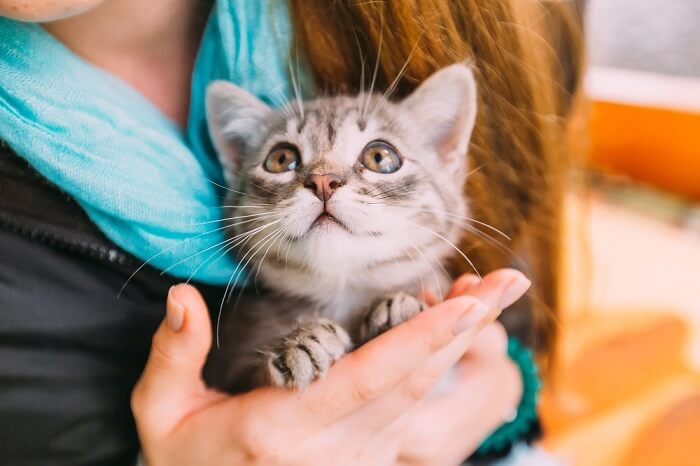
Socializing a kitten is an extremely important part of raising a new cat, and is the key to having a happy, well-adapted adult cat that enjoys human company. If you are adopting a kitten, ask your rescue worker or breeder about the socialization program they’ve followed to ensure you’re getting a confident new member of the family.
Also Read: Fading Kitten Syndrome: Causes, Symptoms, & Treatment
Frequently Asked Questions
What is the best way to socialize a kitten?
The socialization process takes a long time—you should start at 2 weeks and slowly build up handling and exposure to noises and sights until the kitten is past 7 weeks of age. It’s important to keep experiences positive and respond to your kitten’s signs if they are not comfortable.
How do I socialize my aggressive kitten?
If your kitten is under 7 weeks of age, you can follow the usual socialization protocol, taking care to take things slowly so as not to frighten them.
Most young kittens are naturally curious so sit with them for a while and let them get used to you being near them before attempting to move forward. If your kitten is more than 7 weeks of age, it might be best to discuss with an experienced rescue or behaviorist to find out the best way to approach them.
At what age is the critical socialization period for kittens?
The critical socialization period for kittens is 2 to 7 weeks. This is the time when a kitten’s brain is most open to new experiences and they are learning their place in the world, and therefore the time when they will best respond to positive new experiences.
How do you socialize an undersocialized cat?
Once a kitten has passed 7 weeks of age, it’s technically not possible to socialize them. Their brain development has gone past the point where socialization works the same way. However, it’s possible to help them settle around humans with lots of positive reinforcement. It’s always best to let cats come to you in their own time rather than force them to interact.
